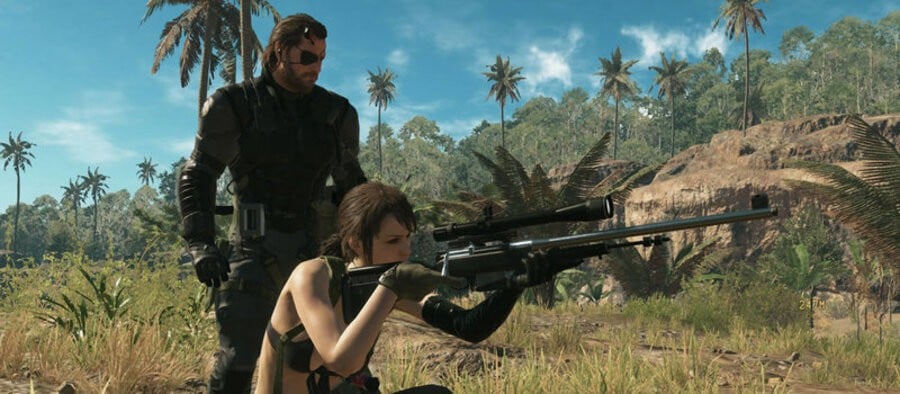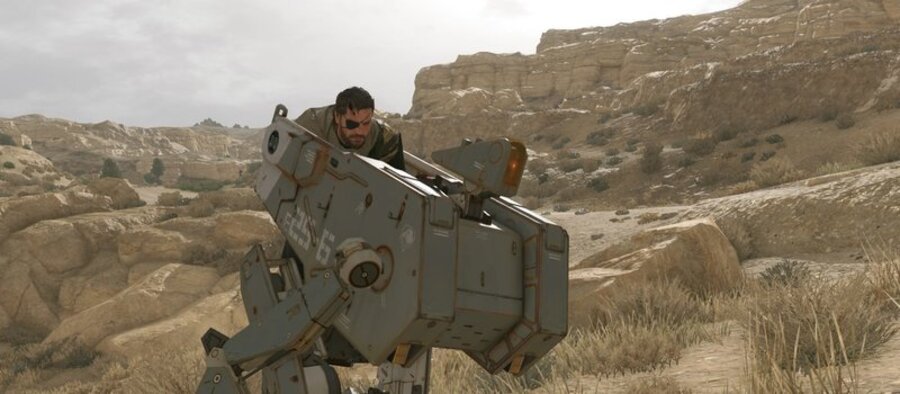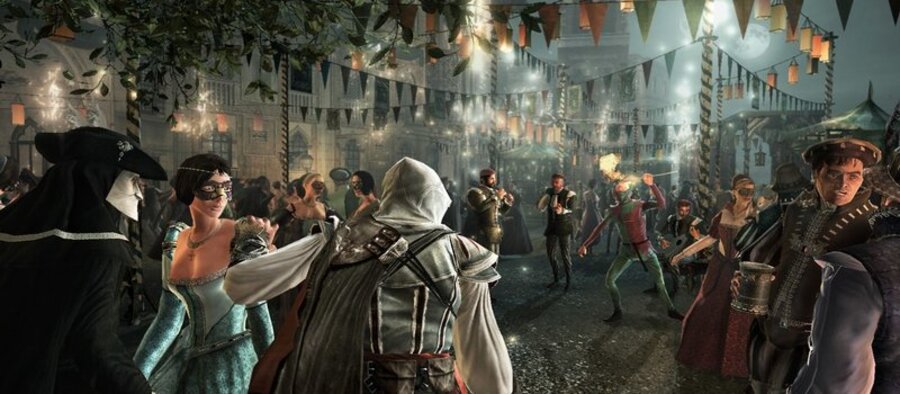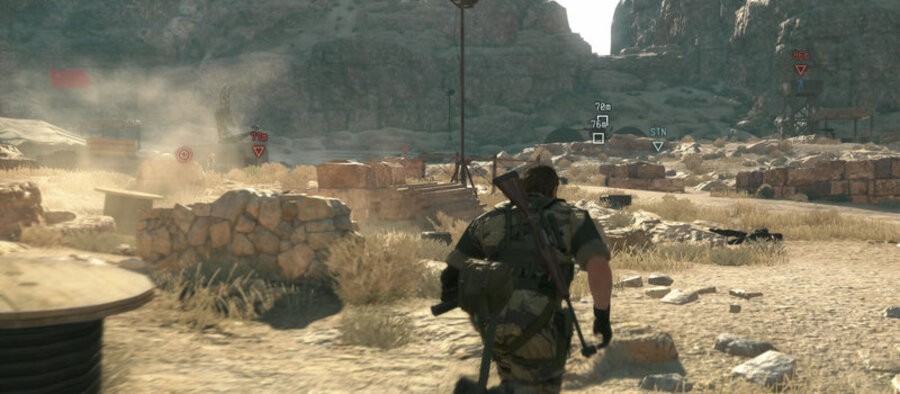
I've finally had a chance to really sink my teeth into Metal Gear Solid V: The Phantom Pain this weekend, and I've already came to one pretty dramatic conclusion: it has the best open mission design that I've experienced in a game. A pretty bold statement, I'm sure you'll agree, but it's one that I'm quite confident in - and not just because everyone on the internet seems to be raving about how brilliant Hideo Kojima's latest release is.
If you don't already know, The Phantom Pain allows you to replay cleared missions in order to earn a better ranking. It's a feature that keeps score-chasers busy, but I reckon its purpose goes beyond simple numbers and ranks. It goes without saying that there are some fantastic operations dotted throughout the sneak-'em-up, and although the game undoubtedly slots into the sandbox genre, it still feels natural to jump back into previous missions and try a different approach.
The problem with me is that I'm crap at stealth games in general. I'm not a patient person, so the idea of sitting behind a wall and waiting for the right time to hatch the perfect plan isn't my idea fun, and when things do inevitably spiral out of control, I panic and tend to bugger things up even further. I've tried to force myself into liking stealth titles in the past - I got Dishonored as a Christmas gift years ago and desperately tried to enjoy it - but I've come to accept that I simply can't be arsed.

That's never been the case with the Metal Gear Solid series, though. For whatever reason, I've always been surprisingly good at them; they're the only stealth games that I can stomach, and I think that The Phantom Pain has helped me come closer to realising why this is.
Long story short, it's the mission design. Metal Gear Solid has always been about adapting to your situation, and that's exactly why it clicks. Unlike in other stealth titles, it's not necessarily game over when you're spotted - you almost always have options. All of the gadgets, the hiding places, heck, even the codec calls - they all combine to create stealth games that are about how you achieve your goal, rather than if.
Just briefly, let's compare this to the industry's most popular stealth franchise: Assassin's Creed. Before Unity introduced its 'black box' mission design, which finally allowed you to complete objectives with some freedom, it was either sink or swim when it came to assassinations. Supposedly to make sure that players wouldn't just slaughter their way to the target, Ubisoft's series employed incredibly linear mission design time and time again. Get spotted by a guard? Instant game over. Lose sight of your target for more than ten seconds? Game over. That's not really stealth - that's just funnelling the player through a series of linear challenges where their best friend is trial and error.

The Phantom Pain's missions are a world away from this stunted scope, and that's the main reason as to why they're so consistently engaging. In past Metal Gear titles, there's always been a sense of freedom - at least to an extent - and Metal Gear Solid V is the evolution of that. By embracing open environments, the development team has arguably given the series' core stealth mechanics the freedom that they've always deserved. The result is a stealth title that even I, Robert 'Just Let Me Shoot Them' Ramsey, can fully appreciate.
Going back to the fact that the game allows you to replay past missions, I decided to really put its open design through its paces. I chose to replay one of my favourite operations three times, and each time, I'd try a completely different approach; I'd grimace through a stealth run, go guns blazing through a third-person shooter run, and for the final attempt, I'd bank everything on my ability to adapt.
All three times, I succeeded in reaching the target which was housed deep inside of a Russian base, and all three times, I managed to extract in one piece. Sure, the stealth run got a little heated when I saw a guard go into the building where I'd hid two of his unconscious buddies , but the fact that I got out of that mess without once triggering mass panic is a testament to the title's expertly balanced difficulty. You can cut corners - just don't expect a smooth ride if you do.

The same was true of the action-orientated run - I ended up holding off an entire wave of reinforcements because some lucky git managed to make it to the radio before I could gun him down, but I still managed to do things my way.
But it was the third attempt that made me want to take the disc out of my PS4 and salute it. This run had a bit of everything - I started stealthy, mucked it up, killed a few guys, hid somewhere for ages, stole a jeep, retreated to the hills, sniped several pursuers, ran back to the base while everyone was outside of it looking for me, got to the target, made a run for it, took out three guards on the perimeter without raising the alarm, forgot about the bodies, and ended up playing cover-shooter with a platoon of soldiers at the extraction zone. It was absolutely ridiculous, but that didn't stop it from being utterly gripping.
That last run made me realise that the whole thing's basically tweaked to perfection. Where countless games have promised total mission freedom and ultimately been found lacking, Metal Gear Solid V swoops in and makes it look easy. As far as I'm concerned, sandbox gameplay has never been so impressively refined.
Do you agree with Robert or has his mind been replaced with Patriot AI? Attempt to stealth your way into the comments section below before going all Rambo on us.

Comments 30
Love the game so far, my only major gripe though is that compared to the Witcher 3 and GTA V, the actual open world is pretty bare bones. Outside of the Soviet outposts and checkpoints, what about the Afghan civilians, or just a greater dynamic in enemy and neutral NPC's. Even mother base is oddly quiet and sparse given the size of it. Again, great game, the missions themselves are stellar, but the actual open world portion of it isn't really that impressive, it does not seem like a living, breathing place.
Phantom Pain is ace as far as gameplay, but compared to the other mentioned titles (Rockstar and CD Projekt), it falls a bit short.
I agree...with everything!
Absolutely love this game and it's made me realise how far behind games like GTA are in terms of mission structure and freedom. I can see where @sub12 is coming from in terms of the lack of population in the open world, though I personally don't see it as an issue and like it the way it is just focusing on the action. Where I will agree is that I'd like to see some more people at Mother Base and visit all my people in R&D and so on. Best game on PS4 so far and I think I'll be playing for some time.
I agree, I fell out of love of 'open world' early days in, I always found the actual gameplay lacking... In gta all I used to was play 'run from cops as I enter cheat codes to rank them down'. While that was fun, I never appreciated the missions in these games and got bored early, they were less open the the actual environment you were playing. Finally recently buying a ps4 and now after the rave reviews I felt I should give this a try, while I don't appreciate being badly graded (my fault I guess!) I just ignore that and have a great time working out my own approach to the game!
Have to completely agree, I love stealth and I've always wanted a truly proper stealth sniper title, nothing has been good enough really. The same goes for 'stealth' games in general, I've never likes assassins Creed, it's not stealth and it's not fun. Hopefully this is the game I've been waiting for.
I got Dishonored as a Christmas gift years ago and desperately tried to enjoy it - but I've come to accept that I simply can't be arsed.
Agreed me too.
Love Phantom Pain - just wish my wife would go into labour so I can play it for 2 wee.... Err yep the phantom pains great.
Agree agree agree ! Kojima and company are incredible. I really hope he steals away his core team for where ever he goes next. I think the best case scenario for the gamers would be if he opened his own studio and went indie so he could be completely free to build what he wants to build and not have a publisher pushing for this or that. He's a creative genius.. and not the kanye west kind haha. (Don't know if you've seen the video on Facebook of kanye saying that and then the little kid is like shut up you f****** ***hole. Hahahah)
But yeah, I'm going to be playing this game for a long time. Best part is I've got a ton of time to play the single player while waiting for mgo on pc..
Also, I know mad max was shadowed pretty heavily by mgs but if you get a chance, pick it up. It's really good as well.
@sub12 Funny you mentioned Rockstar, I've been thinking that I wouldn't be surprised if they snapped up Mr Kojima soon and establish a Rockstar Japan studio with him in charge. They're known for making big, open world, expensive games, and they always take a long time between installments, but making sure that when they come out they're amazing. Kojima fits right in there in my opinion.
Erm, with all these articles on it's rightful place as the king of stealth - I can't remember the last time I spent hours just pouring and savouring optional side quests in any game including GTA - where on earth is Push Squares' review?!?
I finally started playing, and as horrible as I am, I'm totally and utterly hooked.
This is the PS4 game I've been waiting for. Well, I thought the games I had been waiting for were already come with Dragon Age Inquisition and Witcher 3. But I was wrong. THIS is the game I was waiting for- I just never knew it until now.
I couldn't agree more with this write up. I've already had several moments of feeling like a bada$$, even when I screw up. I like to the take the non-lethal approach whenever possible, but I'm glad the game allows you to set up your loadout so you're well situated for every situation and the missions are brilliantly designed. If this is Kojima's last MGS, he has left the series on an extremely high note and Konami would be wise to leave well enough alone.
@mitcHELLspawn
I hope somebody at Konami wakes up and realizes the company made a massive mistake and does whatever to make things right with Kojima. It's a shame to see such a once great company making so many idiotic decisions.
I may actually play this now. As long as it's not like MGS 4 then I should enjoy it
So Mr Ramsey, this or The Witcher 3. Which is the better game?
@ApostateMage
Both are excellent games & are different games, but The Phantom Pain is definitely the better game.
Afghan is a war torn country so you cannot expect it to be populated like GTA, I don't know why people expect it to be.
The Phantom Pain is a phenomenal game, I love it & will be playing it for a long time to come.
All of this is absolutely spot on, apart from one point right near the end which I was frustrated by yesterday. There is one mission that pretty much forces an action approach (because for some reason at this point in the game and no other the enemies seem to spot you perfectly even in a sandstorm), and represented quite a step up in difficulty due to a large potential for occasionally cheap one shot deaths. This was more pronounced because for some reason it was the only point in the game where I didn't have the option to abandon mission and return to the ACC, which would have allowed me to choose more appropriate gear and then have another go. Even quitting right the way back to the title menu would drop me back at the same point when I came back in.
I did it in the end, but it took me a few goes, and I know I would've had an easier time of it if I'd been able to exit, develop some new gear and do side ops while I wait, and then go back to it better equipped. Only time I've ever seen that happen though, the rest of the time the balance has been consistently perfect!
@banacheck
You would see a populace for sure, something, sure one village out of the lot may be cleared out, but you would see Afghans soldiers or civilians working for the Soviets directly or indirectly, you would see villagers running errands ot setting up shop, as well as nomads popping a tent here and there, you would see some kind of traffic outside of just the same truck.
I understand the Soviets where brutal, and they would level a village if it was considered extremely hostile, but regardless, you would see something besides just Soviets!!!
Agreed, shame the story sucks hard by the end.
@Galvatron We'll have it published this week if all goes to plan. We've spent aaaaages on it!
@Jazzer94 I've enjoyed it for the most part, but with only one mission left I have a very strong feeling it's not going to be wrapped up properly.
I did see an article somewhere (will try and find it in a minute) about a mission that was cut from the game but actually takes place after the ending and ties up a lot of loose ends. Evidently there is deleted footage from this in the collectors edition, and should be watched to truly finish things off. Can't understand why on earth Konami would cut anything that significant out of the game, but nothing they really do surprises me anymore.
Never got into the previous iterations due to my poor stealth skills, and found myself giving up titles like Splinter Cell due to it.
However this is a breath of fresh air. Having watched and read so much, i had this 99% nailed on that it would let users do missions however they wished, but was still a tad concerned, but after playing for some five hours, i cannot praise it highly enough..
As mentioned, we could see more NPC's but its only a small gripe, while the story is as ever an oddity in itself. But i honestly don't care when it plays and looks this good..
@ApostateMage Very tough to call, but I haven't finished MGSV yet.
I think purely based on my own personal taste, nothing will beat The Witcher 3 for me this year, unless Fallout 4 goes above and beyond.
The 60fps of MGSV is glorious, though. Something all PS4 games should aspire to.
@ShogunRok
I would've wondered if its cross-gen nature is what allowed MGS V to run at 60 fps on PS4 but having now played it, the game looks beautiful, you wouldn't know it's also on last-gen consoles. So that does leave me to ask why most of these games, including apparently Uncharted 4, can't also look outstanding and run 60 fps. I hate to use the word laziness, especially in reference to a developer as great as Naughty Dog, but after MGS V there is zero excuse for any game not to hit 1080p, 60 fps. Companies need to stop taking the easy route, or in the case of some third parties, the MS payoff, and do work. If they have to start paying Konami to use the Fox engine, do it.
I'm at 70 hours now and only on mission 23 as I'm having so much fun just securing resources and doing side ops (only got a couple more facilities to level to 4/4).
Getting a certain buddy is a game changer once you get the bond to 80 or so.
Brilliant game and one I'm considering platinuming.
@Cron_13
Yup, it's extremely easy to get caught up in the side stuff. I actually remember Peace Walker being the same. Some of the side ops are as fun as the main missions.
@Gamer83 It does make you wonder. There are bits of MGSV that look a bit rough - some of the textures are muddy and some of the models can be a bit basic - but overall it looks great.
In truth, I'd rather see games go for 60fps than high end graphics every time, but that's just how the industry works. If a publisher's going to earn sales off a lovely looking trailer or some amazing screenshots, it's going to go that route every time. Damn and blast!
@ShogunRok
The frames per second are more important for sure. Nothing takes me out of the experience faster than massive and constant dips in framerate. I can tolerate a constant 30 but if the trade off to get constant 60 fps means 900p, so be it.
@SteveButler2210 if Im right, its still there, its like mission 42 or something as they skip from 41-43 or whatever it is.
As far as I know it takes very specific actions to unlock and Konami reached out and asked no guides like Prima to publish how to get it.
@ToOGoodOfAPlaya nope that's mission 46 you're thinking of. I have all missions 1 to 50, but there was going to be a mission 51 which wraps up Chapter 2 but got cut. Then the secret mission ties off everything, but without mission 51 there's still a huge hole in the plot.
@SteveButler2210 Right ok.
I knew it was something like that.
Fair enough.
Im only at 20 or so.
Great game can't wait for the MP i'm not really intrested in raiding other people's base's it's the TDM where one team has lethal weapon's and the other non lethal i'm hyped for as well as other's, can't wait.
Tap here to load 30 comments
Leave A Comment
Hold on there, you need to login to post a comment...